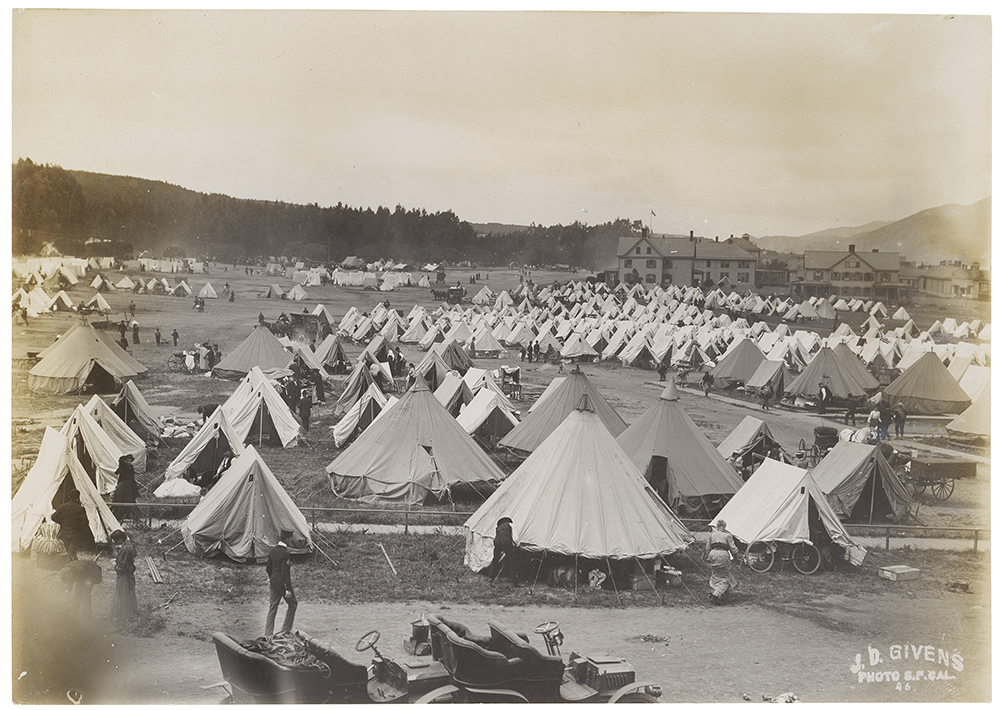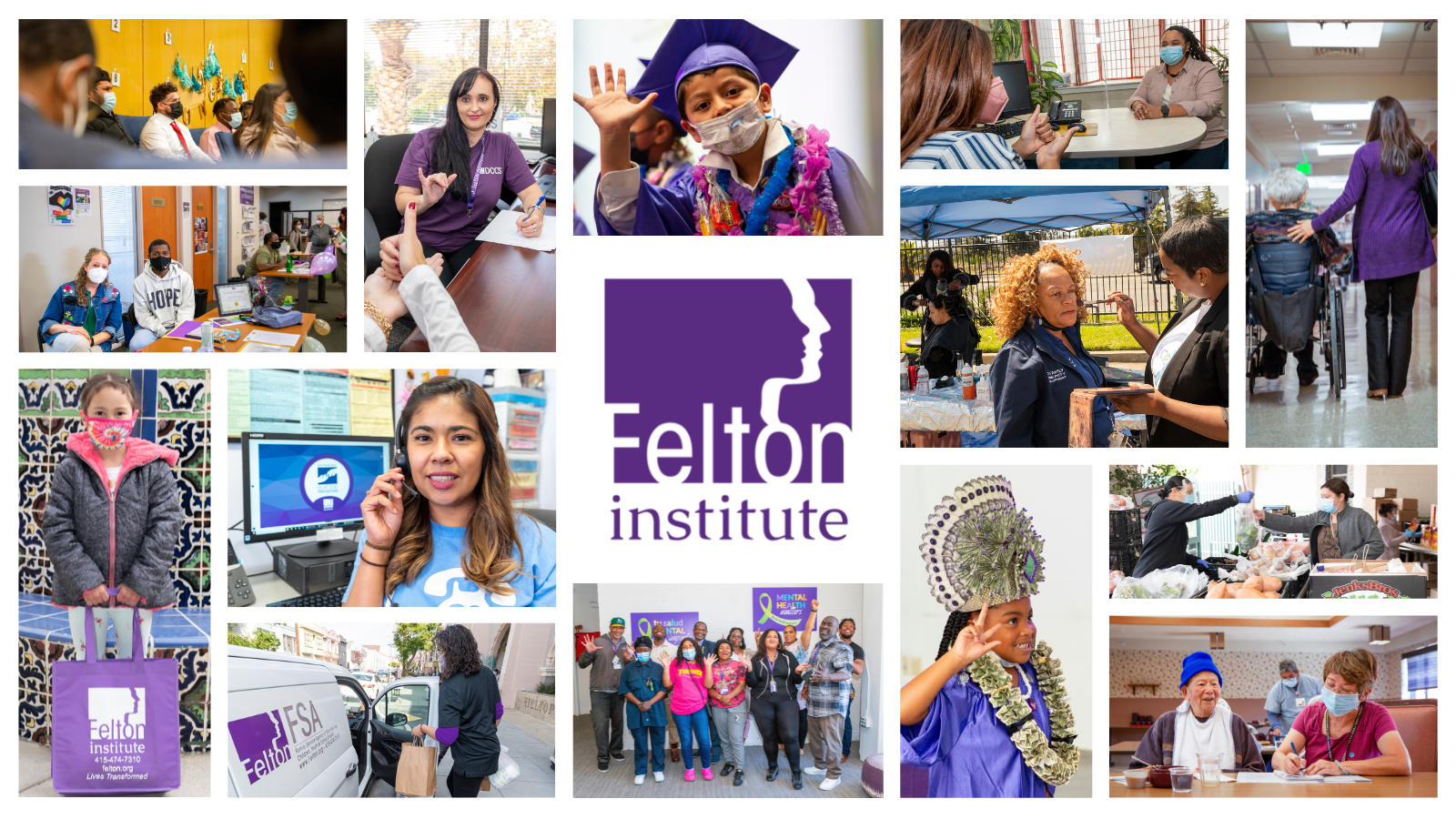
Felton Institute is a leader in providing cutting-edge services that transform people’s lives. Founded in 1889 as the first nonsectarian relief organization in the city of San Francisco, Felton’s historical timeline encompasses innovation and resilience. Its groundbreaking programs and services are interwoven into the fabric of Bay Area history; in 1906, Felton directed the entire San Francisco Earthquake Relief Program as well as provided services for orphans and introduced the first employment agency in the United States, among other notable accomplishments. Since its early beginnings, Felton has recognized the importance of fostering programs and services that positively impact the community and beyond. Felton’s early leader Dr. Katherine “Kitty” Felton, for whom Felton is named, presciently noted, “In the long run, progress anywhere along the line means progress everywhere.”
In the 133 years since Felton’s founding, countless individuals, families, and communities have benefited from the enduring dedication of passionate leadership and a workforce that continues to serve and empower others. In the present day, Felton boasts over fifty programs serving those impacted by the justice system, individuals struggling with mental health, preparing children for educational success, providing older adults with critical resources, and more.
Early Years: Leaders in Innovation
Felton Institute was established during a chaotic period in Bay Area history. During the Gold Rush in the nineteenth century, San Francisco experienced rapid expansion and charities were created to serve and support the emerging and disenfranchised populations. At best, many of these organizations were largely disorganized, and at worst, they inflicted inhumane treatment of the most vulnerable in local orphanages and mental health institutions. In 1889 Felton Institute, originally called Associated Charities (renamed Family Service Agency in 1958 and then to Felton Institute in 2014), was created. The young organization was instrumental in developing a system of professional social services before the city had public welfare programs. It provided nutrition, employment, and housing programs saving thousands of families from destitution.
Led by women trained in the emerging field of social work, Associated Charities provided support across a range of services. Dr. Katherine “Kitty” Felton was appointed Executive Director in 1901, a notable accomplishment for women at the time particularly since many rights were denied to them, including voting rights which would not be granted for another nineteen years. Called the “conscience of San Francisco,” she led the first foster home system in California to address the high infant mortality rate. A great success, the foster parenting experiment brought San Francisco’s infant mortality rate to the lowest rate of any city of its size in the United States. Additionally, Associated Charities developed the first employment agency in the U.S. The organization would soon shift its focus from advocacy to direct services when it began directing the San Francisco Earthquake Relief Program in 1907. Since that time, Felton has flourished in the present day, continuing its commitment to empowering others.

Survivors of the 1906 Earthquake slept in tents in city parks and at the Presidio.
Present Day: Strength in Adversity
Felton Institute’s very foundation was built upon the idea – give children and families in crisis access to social services and resources in order to help them build upon their inherent strengths and develop self-sufficiency. Adapting to the emerging needs of the community, Felton has expanded and thrived. The organization has been honored throughout the years for its continued hard work and dedication. Supporting cradle-to-grave endeavors, Felton’s services, many of which successfully collaborate with city and state agencies, offer award-winning programs such as the early psychosis mental health program that was awarded the National Council of Mental Wellbeing Award for Excellence in 2014 and 2015, Early Care and Education programs that foster a cradle-to-college pipeline, service linkage for the unhoused and older adults, as well as suicide prevention, among other vital services. Felton’s newest incarnation, the Justice Division, serves justice-involved individuals, providing critical support to the formerly incarcerated and young people navigating the criminal justice system, among other programs.
Felton’s workforce is as diverse as the community it serves. Today, the organization employs a racially and ethnically diverse executive leadership and workforce as well as those with lived experience – from former pregnant teen clients to the formerly incarcerated who provide their expertise and compassion. Boasting over 500 employees, Felton reaches across all racial, ethnic, cultural, social, and linguistic lines. In addition, Felton has expanded its programs across the Bay Area. No longer confined to San Francisco, it has extended its geographic reach to six Bay Area counties that include San Francisco, Marin, Alameda, San Mateo, Sonoma, and Monterey counties. These successes in expanded services have been honored by the very city in which Felton was founded.
In 2019, Felton Institute was honored by San Francisco Mayor London Breed when she declared October 30th Felton Institute Day. The day is a symbolic acknowledgment of the enduring legacy of resilience and providing critical services to those in need. Mayor Breed said of the pioneering organization, “Felton is an important partner in making us deliver what is necessary to make San Francisco a better, more equitable place for our residents.” That sentiment especially rang true when the worldwide Covid19 pandemic hit in 2020 that brought hardship, fear, and uncertainty to the nation.
Honoring Felton’s history of successfully responding to local and national crises, the organization responded swiftly and efficiently to the pandemic. Felton drew upon its history of resilience, incorporating technological advancements for adapting to shelter-in-place protocols that transformed needed services into virtual models and providing critical programs. This included upgrading technology to respond to crisis calls with Felton’s San Francisco Suicide Prevention; addressing the needs of older adults in isolation via tech squad tutorials facilitating wellness checks; as well as providing remote learning opportunities for children enrolled in Early Care and Education.
Felton’s long and varied legacy is one that encapsulates strength and innovation as it empowers those it serves. Founded over a century ago, the historic organization has uplifted community members whilst imparting self-sufficiency. From the 1906 San Francisco Earthquake to the 2020 Pandemic and all in between, Felton has led with intention. Creating and fostering programs that uplift individuals, children, and families through its critical services, Felton moves forward with confidence, inspired by those they serve.
About Felton Institute: Founded in 1889, Felton Institute responds to human needs by providing cutting edge, evidence-based mental health and social services that transform lives. Felton Institute is a tax-exempt organization registered 501(c)(3) nonprofit under EIN 94-1156530.
Offering more than 50 acclaimed and honored programs that address homelessness, mental health, prenatal, adolescent, adult and senior needs, Felton Institute provides services in San Francisco, Alameda, San Mateo, Marin, and Monterey counties.
Felton is named for its social services pioneer and executive director Dr. Katharine “Kitty” Felton who was called the ”conscience of San Francisco” and was committed to ensuring that children and families in crisis have access to social services and resources in order to help them build upon their inherent strengths and develop self-sufficiency. www.felton.org
